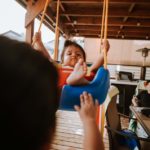 It’s sadly common for immigrant communities to show lower levels of political engagement than native communities, but recent research from the University of Georgia suggests that this isn’t always the case. The study shows that when Latinx children take on adult responsibilities, they become far more politically engaged as a result.
It’s sadly common for immigrant communities to show lower levels of political engagement than native communities, but recent research from the University of Georgia suggests that this isn’t always the case. The study shows that when Latinx children take on adult responsibilities, they become far more politically engaged as a result.
Children may have such responsibilities foist upon them due to the long hours their parents work, the language deficiencies of their parents, or even the immigrant status their family has. Regardless of the reason, it seems to result in higher rates of political participation.
“There is thriving in spaces that we wouldn’t necessarily expect because of the hardship related to these environments,” the researchers say. “Instead of dismissing groups as inactive or disengaged, we just need to figure out where to look–sometimes in places we haven’t typically examined–to see how they participate in the political process.”
Political engagement
The research builds on previous work that describes the various noncognitive skills that are developed during adolescence and which support voter turnout. These skills include even-temperedness, patience, hard-work, self-efficacy, altruism, and follow-through.
The researchers argue that taking on various adult responsibilities, especially if they involve language brokering, helps children of Latinx immigrants to develop these skills. They define language brokering as translating or interpreting for parents or other family members.
“Young people are providing these services roughly from the time they’re 6 or 7, and my argument is that if they can prevail in these spaces, they’re going to be able to overcome the obstacles typically associated with political participation,” the researchers say. “And it’s clear that they do.”
Indeed, students who were frequently involved in language brokering activities were 19% more likely to rally, 12% more likely to attend political meetings, and 20% more likely to sign petitions than average college students. What’s more such youngsters were also 11% more likely to talk politics with their parents, 12% more likely to suggest a political party or candidate to their parents, and 7% more likely to start political conversations at home. Even engaging in household chores was found to boost the likelihood of voting by up to 8%.
Class distinction
Interestingly, however, when the youngster had at least one parent with a college degree, the chores didn’t seem to impact their subsequent political engagement. When the children’s parents didn’t possess a degree, however, the boost was evident.
“The frequency of chore assignments actually has a pretty big impact on turnout compared to traditional influences we think about, like parents’ education or a young person’s own educational status, income, even access to newspapers as a kid,” the researchers say. “Sometimes those effects wash away, but this chore assignment variable is persistent even in midterm elections that typically have low-level turnout.”
The results highlight how generational political inequality can be overcome, often in quite unexpected ways. By contributing at home at an early age, the authors argue that it’s no surprise that they want to contribute to wider society as they become adults.
The authors argue that our views on political socialization were largely formed in the 1960s, at a time when immigration flows were low and immigrant communities were not really factored into the analysis. It leads, they argue, to an incomplete picture.
“Our question was: What about immigrant communities? There’s no top-down political socialization, necessarily. Values are, of course, being transmitted from immigrant parents to their children, but there’s not always a clear indication that those values neatly map on to the American two-party system, especially if you’re a new immigrant,” they say.
“This paper highlights that we should consider looking at other political behaviors beyond voting. People who do this type of language brokering may be unable to vote, but that doesn’t mean that they’re not involved in the political process.”